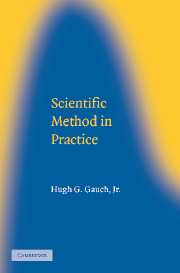Book contents
1 - INTRODUCTION
Published online by Cambridge University Press: 05 March 2015
Summary
This book explores the general principles of scientific method that pervade all of the sciences, focusing on practical aspects. The implicit contrast is with specialized techniques for research that are used in only certain sciences. The structure of science's methodology envisioned here is depicted in Figure 1.1, which shows individual sciences, such as astronomy and chemistry, as being partly similar and partly dissimilar in methodology. What they share is a core of the general principles of scientific method. This common core includes such topics as hypothesis generation and testing, deductive and inductive logic, parsimony, and science's presuppositions, domain, and limits. Beyond methodology as such, some practical issues are shared broadly across the sciences, such as relating the scientific enterprise to the humanities and implementing effective science education.
The general principles that are this book's topics are shown in greater detail in Figure 1.2. These principles are of three kinds: (1) Some principles are relatively distinctive of science itself. For instance, the ideas about Ockham's hill that are developed in Chapter 8 on parsimony have a distinctively scientific character. If occasionally lawyers or historians happen to use those ideas, they will not be reprimanded. Nevertheless, clearly those ideas are used primarily by scientists and technologists. (2) Other principles are shared broadly among all forms of rational inquiry. For example, deductive logic is squarely in the province of scientists, and it is explored in Chapter 5. But deductions are also important in nearly all undertakings.
Information
- Type
- Chapter
- Information
- Scientific Method in Practice , pp. 1 - 20Publisher: Cambridge University PressPrint publication year: 2002
